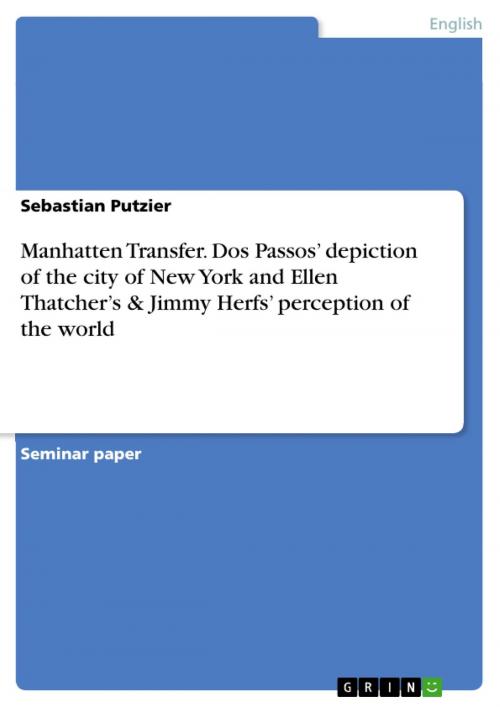Manhatten Transfer. Dos Passos' depiction of the city of New York and Ellen Thatcher's & Jimmy Herfs' perception of the world
Dos Passos' depiction of the city of New York and Ellen Thatcher's & Jimmy Herfs' perception of the world
Nonfiction, Entertainment, Drama, Anthologies| Author: | Sebastian Putzier | ISBN: | 9783638004626 |
| Publisher: | GRIN Publishing | Publication: | February 18, 2008 |
| Imprint: | GRIN Publishing | Language: | English |
| Author: | Sebastian Putzier |
| ISBN: | 9783638004626 |
| Publisher: | GRIN Publishing |
| Publication: | February 18, 2008 |
| Imprint: | GRIN Publishing |
| Language: | English |
Seminar paper from the year 2007 in the subject American Studies - Literature, grade: 2,0, Ernst Moritz Arndt University of Greifswald (Institute of Anglican and American Studies - English Literature and Cultural Studies), course: Fragments shored against ruins: T.S. Eliots frühe Lyrik und die Enstehung der modernistischen Avantgarde, 9 entries in the bibliography, language: English, abstract: Manhattan Transfer is one of the earliest of that type of novels which has come to be known as 'collectivistic'. The idea is to present a cross-section of the social structure, the social organism; an 'over-view' of the subject in which details of individual lives merge in the general picture of society' (Belkind 1971:61). This quotation by Allen Belkind shows that the American author John Dos Passos is not interested in individual characters and their lives in Manhattan Transfer but in how the characters solve the problems and their everyday life in a metropolis, in the city of New York. I would like to deal with Manhattan Transfer by John Dos Passos which was first published in 1925. I will start with some autobiographical facts about Dos Passos to show how he grew up and how his life influenced his works. A short summary and the numeration of stylistic features of Manhattan Transfer will lead to the depiction of the city New York as the actual protagonist of this novel. There are different social groups such as immigrants or poor and rich people described in the book. I want to deal with Ellen Thatcher and Jimmy Herf as the protagonists, and I want to show how they perceive the world. This part is the main topic of this paper. There are numerous essays about the novel Manhattan Transfer and how it deals with New York. I am going to point out the images of New York and their effects on Ellen Thatcher and Jimmy Herf. John Rodrigo Dos Passos was born in Chicago/ Illinois on January 14th 1896. He studied at Harvard University and in Spain. He used the experiences he made as ambulance driver and medic in the Great War (1914-1918). For his first novel called One Man's Initiation (1917). It was first published in 1920. His breakthrough came in 1921 with his second war novel Three Soldiers. In 1925, he published the most significant big town novel of Modernism: Manhattan Transfer. In this novel he portrays an extensive image of New York's social classes between 1890 and 1925. In the paper Facing the Chair, Dos Passos fought for the anarchists Nicola Sacco and Bartolomeo Vanzetti who were executed after their political lawsuits. In his epochal masterpiece, USA, John Dos Passos raged in one 'Camera Eye' episode:
Seminar paper from the year 2007 in the subject American Studies - Literature, grade: 2,0, Ernst Moritz Arndt University of Greifswald (Institute of Anglican and American Studies - English Literature and Cultural Studies), course: Fragments shored against ruins: T.S. Eliots frühe Lyrik und die Enstehung der modernistischen Avantgarde, 9 entries in the bibliography, language: English, abstract: Manhattan Transfer is one of the earliest of that type of novels which has come to be known as 'collectivistic'. The idea is to present a cross-section of the social structure, the social organism; an 'over-view' of the subject in which details of individual lives merge in the general picture of society' (Belkind 1971:61). This quotation by Allen Belkind shows that the American author John Dos Passos is not interested in individual characters and their lives in Manhattan Transfer but in how the characters solve the problems and their everyday life in a metropolis, in the city of New York. I would like to deal with Manhattan Transfer by John Dos Passos which was first published in 1925. I will start with some autobiographical facts about Dos Passos to show how he grew up and how his life influenced his works. A short summary and the numeration of stylistic features of Manhattan Transfer will lead to the depiction of the city New York as the actual protagonist of this novel. There are different social groups such as immigrants or poor and rich people described in the book. I want to deal with Ellen Thatcher and Jimmy Herf as the protagonists, and I want to show how they perceive the world. This part is the main topic of this paper. There are numerous essays about the novel Manhattan Transfer and how it deals with New York. I am going to point out the images of New York and their effects on Ellen Thatcher and Jimmy Herf. John Rodrigo Dos Passos was born in Chicago/ Illinois on January 14th 1896. He studied at Harvard University and in Spain. He used the experiences he made as ambulance driver and medic in the Great War (1914-1918). For his first novel called One Man's Initiation (1917). It was first published in 1920. His breakthrough came in 1921 with his second war novel Three Soldiers. In 1925, he published the most significant big town novel of Modernism: Manhattan Transfer. In this novel he portrays an extensive image of New York's social classes between 1890 and 1925. In the paper Facing the Chair, Dos Passos fought for the anarchists Nicola Sacco and Bartolomeo Vanzetti who were executed after their political lawsuits. In his epochal masterpiece, USA, John Dos Passos raged in one 'Camera Eye' episode:















